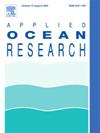无人水面车辆避碰的深度强化学习:最新进展
IF 4.4
2区 工程技术
Q1 ENGINEERING, OCEAN
引用次数: 0
摘要
近年来,深度强化学习(DRL)在无人水面车辆避碰领域受到越来越多的关注。避碰问题可以自然地表述为马尔可夫决策过程(MDP),其中需要在动态和不确定的海上条件下进行顺序决策。通过将深度学习的感知能力与强化学习的决策能力相结合,DRL在解决此类基于mdp的问题时表现出较强的适应性和鲁棒性。本文系统总结了usv避碰DRL算法的框架和原理,重点介绍了基于值的方法、基于策略的方法和多智能体DRL方法。系统地回顾了主要研究课题,包括奖励函数设计、状态空间表示、探索策略、安全法规集成、对干扰的鲁棒性、环境建模和应用领域。分析了当前研究中存在的问题,并提出了未来的研究方向,以推动DRL方法在usv导航中的实际应用。这项工作旨在为研究人员提供基于drl的避碰的综合理解,促进创新并加速自主海事系统的工程实施。本文章由计算机程序翻译,如有差异,请以英文原文为准。
Deep reinforcement learning for collision avoidance in unmanned surface vehicles: State-of-the-art
In recent years, deep reinforcement learning (DRL) has attracted growing attention in the field of collision avoidance for unmanned surface vehicles (USVs). The collision avoidance problem can be naturally formulated as a Markov decision process (MDP), where sequential decision-making is required under dynamic and uncertain maritime conditions. By integrating the perception capabilities of deep learning with the decision-making strengths of reinforcement learning, DRL demonstrates strong adaptability and robustness in solving such MDP-based problems. This review systematically summarizes the frameworks and principles of DRL algorithms for USVs collision avoidance, with emphasis on value-based methods, policy-based methods, and multi-agent DRL methods. Key research topics are systematically reviewed, including reward function design, state-space representation, exploration strategies, integration of safety regulations, robustness to disturbances, environment modeling, and application domains. Challenges in current studies are analyzed, and potential future research directions are proposed to advance DRL methodologies and promote their practical deployment in USVs navigation. This work aims to provide researchers with a consolidated understanding of DRL-based collision avoidance, fostering innovation and accelerating the engineering implementation of autonomous maritime systems.
求助全文
通过发布文献求助,成功后即可免费获取论文全文。
去求助
来源期刊

Applied Ocean Research
地学-工程:大洋
CiteScore
8.70
自引率
7.00%
发文量
316
审稿时长
59 days
期刊介绍:
The aim of Applied Ocean Research is to encourage the submission of papers that advance the state of knowledge in a range of topics relevant to ocean engineering.
 求助内容:
求助内容: 应助结果提醒方式:
应助结果提醒方式:


